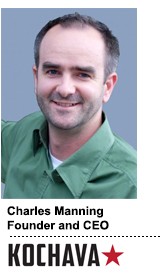 Kochava has spent the past year building up the Collective, its audience data co-op for in-app advertising. Last week, it picked up its first DSP partner – The Trade Desk – to carry the data.
Kochava has spent the past year building up the Collective, its audience data co-op for in-app advertising. Last week, it picked up its first DSP partner – The Trade Desk – to carry the data.
Kochava’s Collective works by gathering data from three sources: aggregated third-party providers, ad networks that pool audience behavior insights and lower-tier app publishers that use Kochava’s free analytics service in return for access to their user data.
“There are other partners out there capturing data like app installs or lead-gen identifiers, which is useful to a degree, but we saw this data as giving a much stronger sense of the audience,” said David Danziger, The Trade Desk ‘s VP of enterprise partnerships.
Many people install a travel app just to book tickets or plan a trip, so an advertiser looking for heavy travelers would be better off targeting people with regular travel-app engagements over time, which Danziger said is the kind of data available in the Kochava Collective.
As a Facebook measurement partner and general mobile attribution company, Kochava has links into a roster of in-app ad networks, and it’s pitching better performance for networks that volunteer user insights based on the stronger cross-app data.
Kochava’s Collective product carries the same privacy concerns as any other co-op, but retailers and others who are commonly asked to share data are reluctant “because they’re sharing data about their customers,” said founder and CEO Charles Manning. “Whereas ad networks are sharing data about their audiences, and the advertiser is the customer.”
Taptica, one of Kochava’s app network supply sources, spent a few months getting advertisers on board but has seen good results since its first Collective campaign in November, according to Taptica’s US general manager, Galia Reichenstein.
“It allows us to build new layers of campaigns with existing advertisers and gives us a new set of leads,” she said, comparing the product to Facebook’s ad network, which layers targeting over aggregated audiences to improve performance.
Since the language-learning software company Rosetta Stone began using Kochava’s Collective in August, it has seen “a more qualified audience” for its mobile user acquisition campaigns, said Matthew Hrushka, the company’s mobile marketing lead.
Looking at data across a network of apps helps to fill in gaps that you’d encounter when building lookalike segments with individual platforms, Hrushka said. Rosetta Stone users are on many apps across many categories, so incorporating data from those apps will make prospects look more like actual Rosetta Stone customers.
The Trade Desk offers about 60 audience partners and 80 overall data partners, “but certain data sets, and I would classify this as one of them, have the potential to be more strategic,” Danziger said.
For instance, it’s too early to speak to results, but he said that The Trade Desk’s product and account teams could eventually extract value from the Collective by seeing which kinds of in-app data are most attractive for buyers, which can then be incorporated into its own products.
Agency Horizon Media also likes the Collective’s second-order data benefits.
“We certainly see scenarios in which we could use this data to help with planning and other initiatives outside of just app user acquisition,” said Sarah Bachman, Horizon’s VP of mobile strategy.
With Facebook’s dominant position in the space, “being an independent ad network will be very difficult if you can’t show buyers similar scale and targeting,” Manning said.
Facebook’s competitive pressure on independent app networks will only grow, and new sensibilities about app-user data don’t resemble the PII-driven concerns of retailers and previous data co-op models, he said.
“They’re open to sharing audience data because it’s a representation of their catalog, if you will,” Manning said.
This post was syndicated from Ad Exchanger.

More Stories
Island Gelato partners with Impact PR
Meta More Than Doubled Revenue From its AI-Powered Ad Tool
How A Digital Media Agency Built Its Own AI-Powered Contextual Targeting Tool